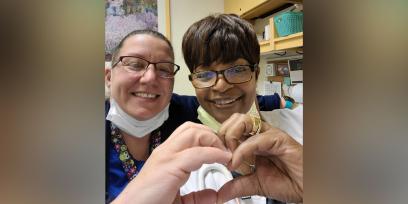More than 600 dedicated healthcare professionals, including audiologists, physical therapists and occupational therapists, proudly certified the United Michigan Medicine Allied Professionals (UMMAP), as their union on Jan. 22. But this was not the only recent victory for UMMAP. In December, 1,300 healthcare professionals--600 behavioral health workers and 700 medical assistants—also officially joined UMMAP, which now represents more than 3,700 healthcare workers across the University of Michigan Health System. With a commitment to an open, transparent and cooperative process, UMMAP is creating an equitable workplace culture at Michigan Medicine, ensuring that healthcare professionals are given the respect and support they deserve.
Kate Robbins, a seasoned physical therapist and UMMAP chair for non-bargained employees, expressed the significance of this unionization: “The acknowledgment of the rehabilitation professionals at Michigan Medicine as a bargaining unit in UMMAP empowers us to stand shoulder to shoulder with our colleagues and provide better care for those we serve. Together, we can advocate for enhanced working conditions, fair compensation and the assurance that our collective voices resonate.”
Challenges in the past were formidable. Throughout the pandemic, healthcare workers demonstrated unparalleled dedication, often seeing their wages decline while tending to the needs of their patients. Now, with staffing shortages impacting nearly all areas of the healthcare system, these professionals find themselves doing more with less.
For Robbins, who has been a physical therapist in Michigan for seven years, the decision to organize gained momentum during the pandemic. Witnessing nonunionized workers losing benefits, including retirement and continuing education funds, became a catalyst for change. “I sacrificed during the pandemic, put my family at risk and myself at risk; and to have the university take away our benefits was a blow and a reminder that they can do this to us at any time in the future. I said they are showing us who they are by their actions.”
Robbins, no stranger to the union environment with her grandfather leading the United Auto Workers in the late 1970s, emphasized her strong connection to workers' rights and the fight for a living wage and a better quality of life instilled by her family. “I never thought I would ever have a chance to be part of a union until now, and being involved makes me feel good.”
UMMAP’s mission extends beyond its immediate victories. The union encourages healthcare workers across Michigan Medicine to strive for respect, fairness, equity, and transparency through organizing and collective bargaining. Their sights are set on providing collective advocacy for Michigan Medicine healthcare workers, from the main hospitals in Ann Arbor to the 125 external clinics across the state.
The voices within UMMAP represent a diverse range of healthcare professionals, each with their unique concerns and aspirations for positive change. Greg Mannarelli, an audiologist with Michigan Medicine for 18 years, looks forward to negotiating a contract that gives specialists a say in the workplace. Pay and the expense of continuing education are pressing concerns for Mannarelli and his colleagues.
Katie Patterson, an orthoptist, shares her enthusiasm for helping patients live a better life but also seeks improvements in her own work life. Patterson emphasizes the need for fair and competitive pay and advocates for the tools necessary to provide the best care for her patients.
Kelishia Burks, a medical assistant with six years at the University of Michigan, desires a contract addressing pay equality and a more defined role for medical assistants. Burks actively engages with colleagues to build support for the union, emphasizing the strength in numbers and the collective need for a unified voice.
Lessina Lewis, a medical assistant for seven years at Michigan Medicine, echoes the sentiment of being united. Lewis took a pay cut to join Michigan Medicine for retirement benefits; but when the pandemic hit, the retirement match was put on hold for three years. She sees the union as a means to bring about transparency in pay and ensure that all healthcare team members are recognized for their contributions.
Courtney Iwanicki, a dietitian with 12 years of experience at Michigan Medicine, shares her concerns about fair pay and the increasing pressure of productivity metrics that may compromise patient care. Iwanicki welcomes the prospect of bargaining for a master agreement that will apply to various job titles and create positive changes in the workplace.
The stories of these healthcare professionals reflect a shared commitment to creating a better work environment, advocating for fair compensation, and ultimately improving patient care. As Terrence Martin, president of AFT Michigan puts it, “When workers come together to make their voices heard, they can make meaningful change. With these new additions to UMMAP, we are building power to win fair raises for healthcare workers, improve working conditions, and create safer ratios that will benefit caregivers and patients alike.”
[Adrienne Coles, AFT Michigan press release]



